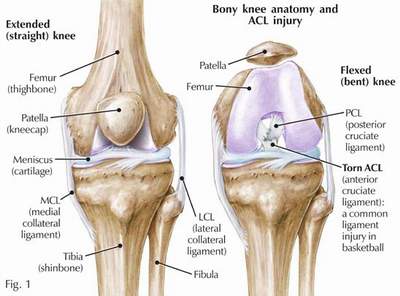The report, published in the American Journal of Sports Medicine, is the first to count ACL injuries across the entire Swedish population - not just among players of particular sports, or in certain regions - which may help explain the findings, according to the authors.
"I think the difference is that earlier studies studied at-risk populations. In those studies, women are more prone to get injured. The difference with this study is that we studied the general population," said Dr. Richard Nordenvall, of Karolinska University Hospital in Stockholm.
The ACL is the key stabilizing ligament in the knee, and is most often injured during sports that involve quick turns or pivoting movements, like basketball, soccer and skiing. It has been estimated that 80,000 cruciate ligament injuries (the majority, ACL) occur in the U.S. every year, and almost half are surgically repaired.
 Data for Sweden was incomplete, so Nordenvall and his colleagues used a nationwide database of patients to see how many Swedes had knee ligament injuries and how many had surgical repairs between 2002 and 2009.
Data for Sweden was incomplete, so Nordenvall and his colleagues used a nationwide database of patients to see how many Swedes had knee ligament injuries and how many had surgical repairs between 2002 and 2009.Overall, 56,659 people in Sweden tore a knee ligament during the study period. The researchers say that works out to an average of 78 tears for every 100,000 Swedish citizens.
Men accounted for about 34,000 of those tears, or 60 percent. Men also had 59 percent of the reconstructive surgeries associated with knee ligament injuries.
Swedish women tended to experience ACL injuries at a younger age (between ages 11 and 20, versus 21-30 for men).
When Nordenvall and his colleagues looked just at the age groups with the highest injury rates, men still had far more knee troubles. The numbers worked out to about 144 tears per 100,000 women between 11 and 20 years old, and 225 tears per 100,000 men aged 21-30.
Darin Padua, director of the Sports Medicine Research Laboratory at the University of North Carolina at Chapel Hill, said he was not surprised by the findings.
The evidence that women are more prone to ACL injuries is fairly specific to sports, not to the general population, explained Padua, who was not involved in the new research.
No one can say for certain why women seem to tear their knee ligaments earlier in life compared to men, Padua added, but he said it probably has to do with the bodys development and movement patterns.
What was uniform among both men and women in the Swedish study was the number who had surgery to reconstruct their ligaments. About 36 percent of men and women opted for reconstruction.
Those who chose surgery, however, tended to be younger - about 27 years old, on average - than those who didnt and whose average age was 35.
Padua said thats to be expected since not everyone needs their knee ligament repaired. He told Reuters Health that people who need surgery are the ones who will likely play sports - like basketball or tennis - in the future.
Typically, the cost of surgical repair on an ACL ranges between $6,000 and $8,000 in the Unites States.
For Nordenvall, the next step is to see what happens in those who have surgery.
"I am right now studying if reconstruction of the cruciate ligament prevents development of osteoarthritis," he told Reuters Health.
But he said its important for people to know how common the injury is.
"Its a common injury and its more common than what has been thought of earlier," he said.
Padua noted this study also helps to illustrate the point that both men and women should be taking part in injury prevention programs, many of which are accessible online, including one available for free on the University of North Carolinas Web site (http://bit.ly/PeLO29).
SOURCE: http://bit.ly/MXMvbC American Journal of Sports Medicine, online June 8, 2012.


0 comments:
Post a Comment
Note: Only a member of this blog may post a comment.